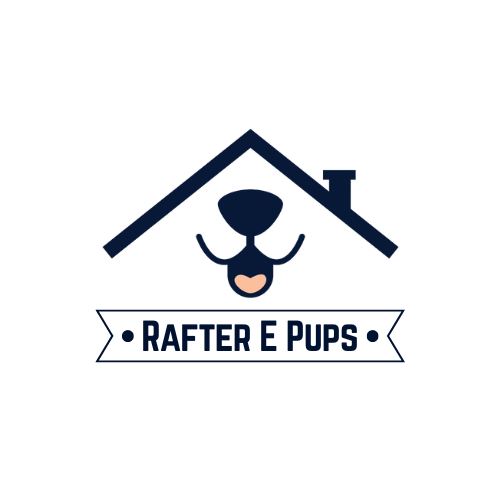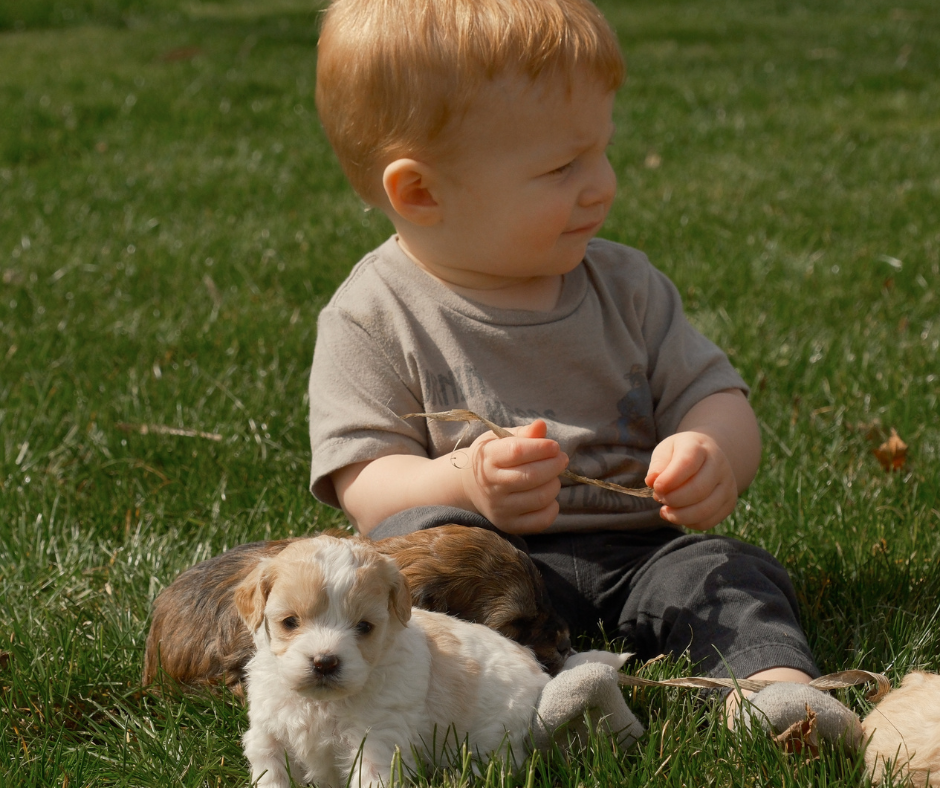Socialization is a critical aspect of raising a well-adjusted, happy, and confident dog. It involves exposing puppies to a variety of experiences, environments, people, and other animals in a positive manner during their formative weeks and months. This period, often referred to as the "socialization window," typically spans from three to fourteen weeks of age. During this time, puppies are particularly receptive to learning and can more easily adapt to new experiences.
We prioritize socialization to ensure our puppies grow into well-adjusted, confident, and friendly dogs. By exposing them to various people, including our kids, and other animals during their critical developmental stages, we prevent behavioral issues like fear and aggression. This early exposure helps them adapt to different environments and situations, making them more emotionally balanced and easier to train, leading to a happier, more harmonious life with their families.
What are the Benefits of Socialization?
Socialization is a vital aspect of a puppy's development that significantly influences their behavior, emotional health, and overall well-being. Introducing puppies to a wide range of experiences, people, animals, and environments during their formative weeks can profoundly impact their ability to navigate the world confidently and comfortably. Understanding the benefits of socialization helps pet owners appreciate its importance and implement effective strategies to raise well-rounded, happy dogs.
- Behavioral Development: Proper socialization helps prevent behavioral issues such as fear, aggression, and anxiety. A well-socialized puppy is more likely to grow into a friendly, well-behaved dog that can handle various situations calmly and confidently.
- Emotional Health: Puppies that are exposed to different stimuli and environments learn to manage stress better. This helps in developing a balanced emotional state, reducing the likelihood of developing phobias or chronic stress-related issues later in life.
- Improved Training: Socialized puppies are generally easier to train. They are more comfortable and less distracted in new environments, making them more receptive to learning commands and behaviors.
- Better Quality of Life: Dogs that are comfortable around other people, animals, and environments can enjoy a richer life. They can accompany their owners to different places, interact positively with other dogs and people, and participate in various activities without fear or aggression.
What is Our Approach to Socialization
Understanding the profound impact of socialization, we have adopted a comprehensive approach to ensure our puppies receive the best possible start in life.
Involving Our Kids in the Socialization Process
One of the unique aspects of our socialization process is the involvement of our children. Children and puppies share a natural curiosity and energy, making them perfect companions for each other. Here’s how our kids contribute to the socialization of our puppies:
- Positive Interactions: Our kids play, cuddle, and engage with the puppies daily, helping them become accustomed to the presence of young humans. This interaction teaches the puppies to be gentle and tolerant, which is crucial for families with children.
- Diverse Experiences: Children often engage in a variety of activities that puppies find intriguing, from playing with toys to running around the yard. These activities expose the puppies to different sights, sounds, and movements, helping them become more adaptable and less likely to be startled by sudden changes in their environment.
Exposure to Other Puppies and Animals During Socialization
Socialization with other puppies and animals is another cornerstone of our program. This exposure teaches puppies essential social skills and helps them understand how to communicate and play appropriately with their peers.
- Puppy Playdates: We organize regular playdates with other puppies. These sessions allow our puppies to interact with others in a controlled, safe environment. Through play, they learn crucial social cues such as bite inhibition, body language, and the boundaries of rough-and-tumble games.
- Introducing Other Animals: In addition to other puppies, we introduce our pups to a variety of other animals. This includes cats, birds, and sometimes even farm animals like chickens or goats. Such exposure helps puppies become well-rounded and less likely to react negatively to different species they might encounter later in life.
Gradual and Positive Exposure
We believe in a gradual and positive approach to socialization. This means introducing new experiences in a controlled and positive manner to ensure the puppy is not overwhelmed.
- Controlled Environment: Initial socialization takes place in familiar and controlled environments where the puppies feel safe. This helps them build confidence before encountering more unpredictable scenarios.
- Positive Reinforcement: We use positive reinforcement techniques such as treats, praise, and play to associate new experiences with positive outcomes. This helps puppies form positive associations with new stimuli, making them more likely to approach new situations with curiosity rather than fear.
What are the Downsides of Getting an Unsocialized Puppy?
Acquiring an unsocialized puppy can lead to numerous challenges that affect both the dog and its owner. One significant downside is the increased likelihood of behavioral problems. Unsocialized puppies often develop fears and anxieties around unfamiliar people, animals, and environments, which can manifest as aggression, excessive barking, or destructive behaviors. These issues can make everyday activities, such as going for walks, visiting the vet, or having guests over, stressful and difficult to manage. Consequently, the dog’s quality of life is diminished as it struggles to cope with situations that well-socialized dogs handle with ease.
Another major concern with unsocialized puppies is the difficulty in training and integration into the household. These puppies may have trouble understanding social cues from both humans and other animals, leading to inappropriate or unpredictable reactions. This lack of social understanding can result in strained relationships within the household and community, making it challenging to create a harmonious living environment. Additionally, the time and effort required to rehabilitate an unsocialized dog can be substantial, requiring patience, professional training, and sometimes behavior therapy. For many pet owners, this can be an overwhelming and demanding process, highlighting the crucial need for early and effective socialization to prevent these potential issues.
Prioritizing socialization is not just about raising well-behaved dogs; it’s about ensuring our puppies have the best possible start in life. By involving our children and exposing our puppies to a variety of other puppies and animals, we create a rich and supportive environment that fosters confident, friendly, and adaptable dogs. This comprehensive socialization process sets the foundation for a lifetime of positive interactions and experiences, ultimately leading to happier dogs and happier owners.

